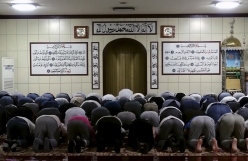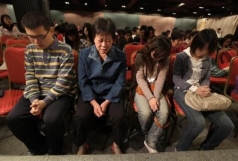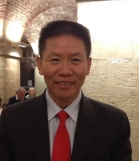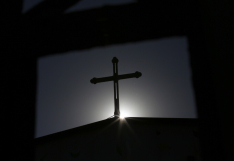Sometime in the last year, a group of mid-ranked government officials gathered for a dinner in a private room in a Beijing restaurant, all slightly nervous, but keen with anticipation.
The guest of honour – a Buddhist master who would predict their fortunes.
The master looked around the room and into the eyes of each of the dozen or so attenders, according to one of those present, who spoke on condition of anonymity as officials and Communist Party members are not supposed to believe in "superstition".
"He picked people out depending on the shape of their eyes and told them whether they had been touched by luck or misfortune," the source, a government official with ties to the leadership, told Reuters.
A few months later, one of the people present whose eyes told of misfortune to come was under investigation for abuse of power, the source added.
"At times like this with so much uncertainty, lots of us are looking for ways to foresee our fortunes," the source said.
The source declined to name the master, citing a fear he may be arrested.
Chinese people, especially the country's leaders, have a long tradition of putting their faith in soothsaying and geomancy, looking for answers in times of doubt, need and chaos.
The practice has grown more risky amid a sweeping crackdown on deep-seated corruption launched by President Xi Jinping upon assuming power in late 2012, in which dozens of senior officials have been imprisoned.
Xinjiang sage
June's announcement of the jailing of the powerful former security chief Zhou Yongkang on graft charges included the accusation he leaked undisclosed state secrets to a fortune teller and healer called Cao Yongzheng, known as the "Xinjiang sage" after the far western region where he grew up.
Zhou was never allowed to appear in public to defend himself. It was not clear if he had a lawyer.
According to Chinese media reports a former senior colleague of Zhou's, Li Chuncheng, had business and personal ties with Cao in Sichuan province, where Zhou and Li were once senior officials, via media companies Cao either owned or worked at.
Li also publicly supported Cao's daughter, a musical theatre director, according to the Southern Weekend, a respected weekly with a track record of covering sensitive stories.
Li was later accused by the Party of abusing his position to engage in "feudalistic and superstitious acts", without elaborating further. Cao's whereabouts – and whether he is in custody – are not known. It has not been possible to reach any of Li or Cao's family members.
Li has also not been allowed to appear in public to defend himself since the Party's accusations. He went on trial in April, but no verdict has been announced.
The founder of modern China, Mao Zedong, banned fortune telling and superstition in puritan, communist China after the 1949 revolution, but the occult has made a comeback since the still officially atheist country embraced economic reforms and began opening up in the late 1970s.
"In China, Mao Zedong was once revered as a god and communism was tantamount to a religion," a retired Communist Party official said, requesting anonymity to avoid repercussions for speaking to foreign media without authorisation.
"But Mao's death and the end of the Cultural Revolution in 1976 left a spiritual vacuum. Today, many Party, government and military officials are lost and resort to consulting fortune tellers because they want to know if they will go 'up' [the political ladder] or go 'in' [to prison]."
Placating the gods
Underground belief in occult practices such as sorcery and prophecy has spread widely enough among Party officials state media to feel compelled to issue numerous warnings in recent years about its dangers.
"Fake masters and false miracle workers have reached in the highest levels," the Guangming Daily, an official party national, warned in late 2013.
The party also fears pronouncements from sages either forecasting its demise or spreading panic among the public with predictions of disaster.
Even so, some of what had been considered superstition by the Party in its communist heyday, like "feng shui", or geomancy, has enjoyed a resurgence of official support, according to sources with ties to the leadership and feng shui masters.
Wu Zhongmin, a professor at the Central Party School, which trains rising officials, told the Beijing News last year that corruption and superstition often go together, as officials try to placate the gods to forgive their crimes.
"They must know that 'heaven sees all', but they can't restrain themselves," Wu said.

















